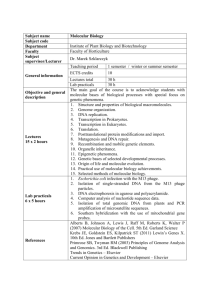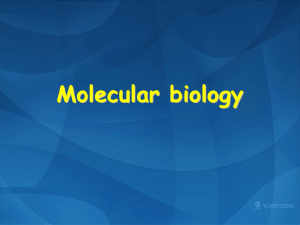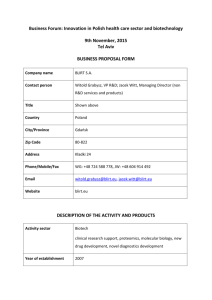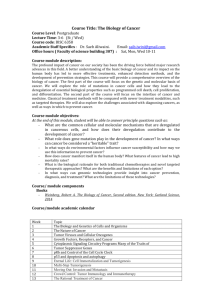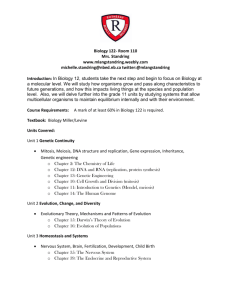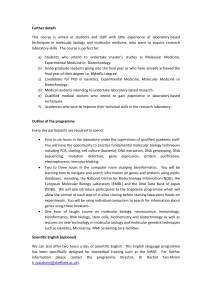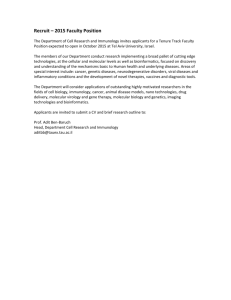section 1: module specifications
advertisement
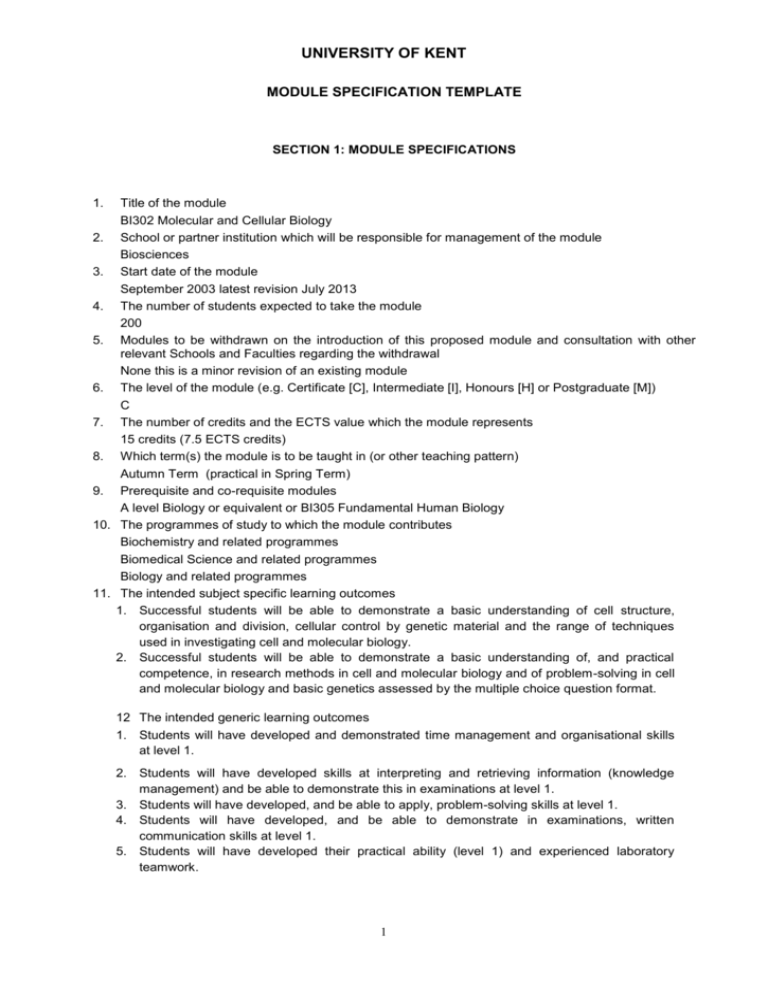
UNIVERSITY OF KENT MODULE SPECIFICATION TEMPLATE SECTION 1: MODULE SPECIFICATIONS 1. 2. 3. 4. 5. 6. 7. 8. 9. 10. 11. Title of the module BI302 Molecular and Cellular Biology School or partner institution which will be responsible for management of the module Biosciences Start date of the module September 2003 latest revision July 2013 The number of students expected to take the module 200 Modules to be withdrawn on the introduction of this proposed module and consultation with other relevant Schools and Faculties regarding the withdrawal None this is a minor revision of an existing module The level of the module (e.g. Certificate [C], Intermediate [I], Honours [H] or Postgraduate [M]) C The number of credits and the ECTS value which the module represents 15 credits (7.5 ECTS credits) Which term(s) the module is to be taught in (or other teaching pattern) Autumn Term (practical in Spring Term) Prerequisite and co-requisite modules A level Biology or equivalent or BI305 Fundamental Human Biology The programmes of study to which the module contributes Biochemistry and related programmes Biomedical Science and related programmes Biology and related programmes The intended subject specific learning outcomes 1. Successful students will be able to demonstrate a basic understanding of cell structure, organisation and division, cellular control by genetic material and the range of techniques used in investigating cell and molecular biology. 2. Successful students will be able to demonstrate a basic understanding of, and practical competence, in research methods in cell and molecular biology and of problem-solving in cell and molecular biology and basic genetics assessed by the multiple choice question format. 12 The intended generic learning outcomes 1. Students will have developed and demonstrated time management and organisational skills at level 1. 2. Students will have developed skills at interpreting and retrieving information (knowledge management) and be able to demonstrate this in examinations at level 1. 3. Students will have developed, and be able to apply, problem-solving skills at level 1. 4. Students will have developed, and be able to demonstrate in examinations, written communication skills at level 1. 5. Students will have developed their practical ability (level 1) and experienced laboratory teamwork. 1 UNIVERSITY OF KENT 13.A synopsis of the curriculum This course will expose students to key themes and experimental techniques in molecular biology, genetics and eukaryotic cell biology illustrated by examples from a wide range of microbial and mammalian systems. It will cover basic cell structure, and organisation of cells into specialized cell types and complex multi-cellular organisms. The principles of cell cycle and cell division will be outlined. The control of all living processes by genetic mechanisms will be introduced and an opportunity to handle and manipulate genetic material provided in practicals. Lectures and practicals will run concurrently as far as possible and monitoring of students' knowledge and progress will be provided by multi-choice testing and feedback in workshops. Functional Geography of Cells: Introduction to Cell Organisation, Variety and Cell Membranes. Molecular Traffic in Cells. Organelles involved in Energy and Metabolism. Eukaryotic Cell Cycle. Chromosome Structure & Cell Division. Meiosis and Recombination. Molecular biology: The structure and function of genetic material. Chromosomes, chromatin structure, mutations, DNA replication, DNA repair and recombination, basic mechanisms of transcription, mRNA processing and translation. Techniques in Molecular and Cellular Biology: Methods in Cell Biology - light and electron microscopy; cell culture, fractionation and protein isolation/electrophoresis; antibodies, radiolabelling. Gene Cloning – vectors, enzymes, ligation, transformation, screening; hybridisation, probes and blots, PCR, DNA sequencing. Applications including recombinant protein expression, trangenics/knockouts, RNAi, genome projects, DNA typing, microarray and ‘…omics’ studies (genome, proteome, interactome, metabolome etc). Practical: Restriction digestion of DNA and gel analysis (whole day) 14.Indicative Reading List Alberts B, Essential cell biology, 3rd Edition, Garland Science Pub., 2009 Templeman Library Classmark QH 581.2 Turner PC, Molecular biology (BIOS Instant Notes series), 3rd Edition, Taylor & Francis, 2005 15.Learning and Teaching Methods, including the nature and number of contact hours and the total study hours which will be expected of students, and how these relate to achievement of the intended module learning outcomes Contact hours: Course content will largely be delivered in lecture format which will address learning outcomes 11.1 and 11.2. The practical class will address learning outcomes 11.2, 12.1, 12.3 and 12.5 The workshop will focus on written communication, particularly under examination conditions and involves analysis of common errors in exams, analysis of exam answers and discussion of strategies for improvement and will address learning outcomes 11.1, 11.2,12,2 and 12.4 Lectures: Test Practicals: Workshops: Feedback 1 23h 1h 6h 1h 1h Self Study: 24h 24h 60h practical write-up reading notes, outside reading for multiple choice reading, revision. 2 UNIVERSITY OF KENT 16.Assessment methods and how these relate to testing achievement of the intended module learning outcomes Coursework 40% i) Practical report (20%) addresses learning outcomes 11.2, 12.1, 1.3 and 12.5 ii) Multiple choice test (20%) addresses learning outcomes 11.1, 11.2, 12.2 Examination 60% i) Multiple choice questions addresses learning outcomes 11.1, 11.2, 12.2 ii) Essay addresses learning outcomes 11.1, 12.2 and 12.4 17.Implications for learning resources, including staff, library, IT and space None this is a minor revision of an existing module 18 The School recognises and has embedded the expectations of current disability equality legislation, and supports students with a declared disability or special educational need in its teaching. Within this module we will make reasonable adjustments wherever necessary, including additional or substitute materials, teaching modes or assessment methods for students who have declared and discussed their learning support needs. Arrangements for students with declared disabilities will be made on an individual basis, in consultation with the University’s disability/dyslexia support service, and specialist support will be provided where needed. 19 Campus(es) where module will be delivered: Canterbury SECTION 2: MODULE IS PART OF A PROGRAMME OF STUDY IN A UNIVERSITY SCHOOL Statement by the School Director of Learning and Teaching/School Director of Graduate Studies (as appropriate): "I confirm I have been consulted on the above module proposal and have given advice on the correct procedures and required content of module proposals" ................................................................ .............................................. Director of Learning and Teaching/Director of Graduate Studies (delete as applicable) Date ………………………………………………… Print Name Statement by the Head of School: "I confirm that the School has approved the introduction of the module and, where the module is proposed by School staff, will be responsible for its resourcing" ................................................................. .............................................. Head of School Date ……………………………………………………. Print Name Module Specification Template Last updated February 2013 3
